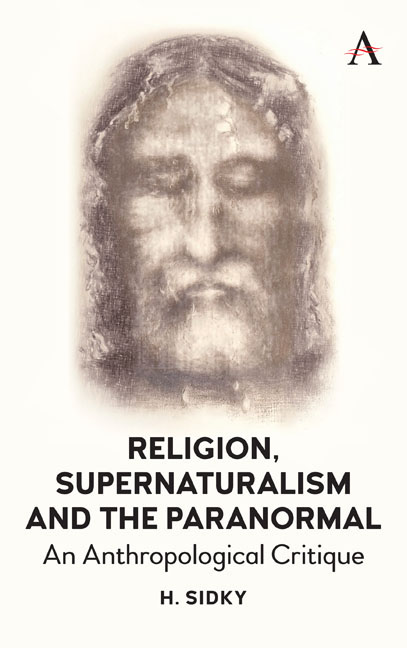Book contents
- Frontmatter
- Dedication
- Contents
- Acknowledgments
- Introduction
- Chapter One The Problem with Religion: Preliminary Issues
- Chapter Two The Unreal Real: The Supernatural, Religion, and the Paranormal
- Chapter Three Can Science Say Anything About Religion and the Supernatural?
- Chapter Four Ghostly Rappings, the Science of the Soul, and the Religious Nature of the Paranormal
- Chapter Five Ghostly Encounters in the Field: Anthropology of the Paranormal or Paranormal Anthropology?
- Chapter Six Why We Think the World Is Haunted
- Chapter Seven Cognitive Biases and Why People Think Eerie Thoughts
- Chapter Eight Miracles as Evidence of God's Actions in the World
- Chapter Nine When God Talks to People: Are Religious Experience Evidence of God?
- Chapter Ten Books Authored by God? Sacred Texts as Evidence of the Supernatural
- Chapter Eleven God's Fingerprints in the Natural World: Intelligent Design, Irreducible Complexity, and Cosmic Fine-Tuning
- Chapter Twelve The Miracles of the Bible: The Quintessential Foundations of Paranormal Beliefs in Western Culture
- Chapter Thirteen Jesus the Miracle Worker, Magician, and Sorcerer
- Chapter Fourteen Jesus's Empty Tomb, Missing Body, and Return from The Dead: Sources for the Paranormal Tale
- Chapter Fifteen The Post-Resurrection Appearances in the New Testament
- Chapter Sixteen Coping with Failed Prophesy: A Socio-Psychological Explanation for the Rise of Christianity
- Chapter Seventeen Conclusions: Why Religious and Paranormal Beliefs Persist and Their Dangers
- References
- Index
Chapter Six - Why We Think the World Is Haunted
Published online by Cambridge University Press: 16 December 2019
- Frontmatter
- Dedication
- Contents
- Acknowledgments
- Introduction
- Chapter One The Problem with Religion: Preliminary Issues
- Chapter Two The Unreal Real: The Supernatural, Religion, and the Paranormal
- Chapter Three Can Science Say Anything About Religion and the Supernatural?
- Chapter Four Ghostly Rappings, the Science of the Soul, and the Religious Nature of the Paranormal
- Chapter Five Ghostly Encounters in the Field: Anthropology of the Paranormal or Paranormal Anthropology?
- Chapter Six Why We Think the World Is Haunted
- Chapter Seven Cognitive Biases and Why People Think Eerie Thoughts
- Chapter Eight Miracles as Evidence of God's Actions in the World
- Chapter Nine When God Talks to People: Are Religious Experience Evidence of God?
- Chapter Ten Books Authored by God? Sacred Texts as Evidence of the Supernatural
- Chapter Eleven God's Fingerprints in the Natural World: Intelligent Design, Irreducible Complexity, and Cosmic Fine-Tuning
- Chapter Twelve The Miracles of the Bible: The Quintessential Foundations of Paranormal Beliefs in Western Culture
- Chapter Thirteen Jesus the Miracle Worker, Magician, and Sorcerer
- Chapter Fourteen Jesus's Empty Tomb, Missing Body, and Return from The Dead: Sources for the Paranormal Tale
- Chapter Fifteen The Post-Resurrection Appearances in the New Testament
- Chapter Sixteen Coping with Failed Prophesy: A Socio-Psychological Explanation for the Rise of Christianity
- Chapter Seventeen Conclusions: Why Religious and Paranormal Beliefs Persist and Their Dangers
- References
- Index
Summary
All proceeds from the usual propensity of mankind towards the marvelous, and that, though this inclination may at intervals receive a check from sense and learning, it can never be thoroughly extirpated from human nature.
— David Hume, Enquiries Concerning the Human Understanding (1748)It is as if there were in the human consciousness a sense of reality, a feeling of objective presence, a perception of what we may call “something there,” more deep and more general than any of the special and particular “senses” by which the current psychology supposes existent in realities to be originally revealed.
— William James, The Varieties of Religious Experience (1902)We impose order [on the world] even when there is no motive to do so. We do not “want” to see a man on the moon. We do not profit from the illusion. We just see it. […] The predisposition to impose order can be so automatic and so unchecked that we often end up believing in the existence of phenomena that just aren't there.
— Thomas Gilovich, How We Know What Isn't so (1991)The human information-processing system is such that we should expect ostensibly paranormal experiences to be frequently reported even if paranormal forces do not exist.
— Christopher French, Paranormal Perception (2001)The ease with which we see faces, in particular, has led to the idea that we are inclined to see supernatural characters at the drop of a hat. Each year some bagel, muffin, burnt toast, potato chip, or even ultrasound of a fetus showing the face of some deity is paraded as evidence for divine miracles.
— Bruce Hood Supersense (2009)In this chapter, I begin my examination of the cognitive and psychological foundations of religious and paranormal beliefs. The main question addressed is, How and why do people think of such things? My anthropological investigations of religious specialists over many years that brought me into contact with a variety of paranormal and supernatural practitioners have led me to the conclusion that humans seem to have particular cognitive biases that naturally result in paranormal ideation. It is as if the misunderstood and mysterious workings of their own minds have mystified humans across space and time.
- Type
- Chapter
- Information
- Religion, Supernaturalism, the Paranormal and PseudoscienceAn Anthropological Critique, pp. 121 - 146Publisher: Anthem PressPrint publication year: 2019



